How Empathy Looks for Each Enneagram Type
When we talk about the “most empathetic Enneagram types,” we’re really diving into a spectrum of empathy that’s as diverse as the Enneagram itself. You might think of a person who can’t watch a sad movie without grabbing the tissues or the friend who knows exactly what you’re going through before you even say it. But “most empathetic” isn’t just about being an emotional sponge. It can be finding solutions, putting yourself in another’s shoes (with emotional boundaries intact), or being sensitive to other people’s perspectives.
In an effort to more closely understand how the nine Enneagram types experience empathy, I surveyed my email list, friends, and social media followers to ask them about their experience with emotions (their own and others). 1,024 people responded to the survey (thank you to those of you that did) and today we’re breaking down the results. If you’d like to share your voice in the survey, you can still do so here.
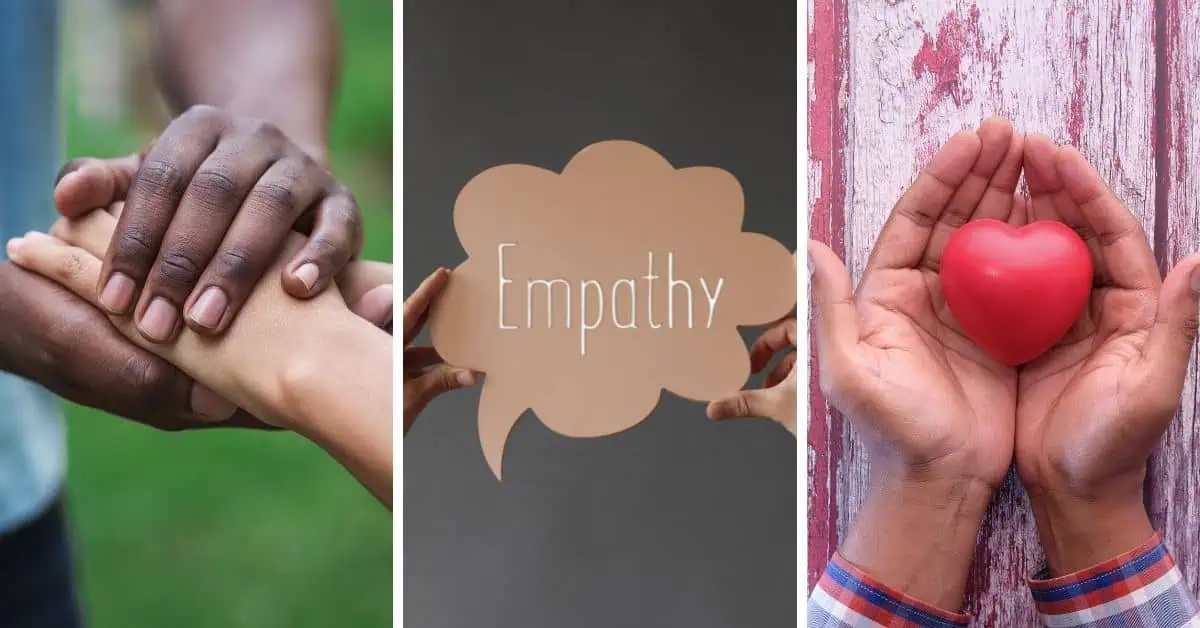
But first, what IS empathy?
Merriam-Webster defines empathy as “the action of understanding, being aware of, being sensitive to, and vicariously experiencing the feelings, thoughts, and experience of another.”
Cambridge Dictionary defines empathy as “the ability to share someone else’s feelings or experiences by imagining what it would be like to be in that person’s situation”
So we’re going to look at several factors as we try to narrow down which type is most likely to be empathetic: How many of that type would call themselves empathetic, how many vicariously experience the feelings of others, and how many can easily put themselves in another’s shoes. Let’s begin!
Not sure what your enneagram type is? Take our new personality questionnaire here!
The Enneagram Types Most Likely to be Empathic
Enneagram 2: The Empathy All-Stars 🏆
Twos practically have empathy stamped in their DNA. Every single Two surveyed considers themselves empathetic, and 85.72% absorb others’ emotions as if they’re catching a flu bug. Twos don’t just sympathize; they dive headfirst into what you’re feeling.
David Daniels, M.D. an adjunct clinical professor emeritus at Stanford University Medical School said of 2s, “We have the propensity to believe that to assure a good and satisfying life we must give fully to others and not be found useless or selfish. Therefore, we put a lot of energy into doing our best to fulfill others; we take care of their needs. We enjoy being “the one” that makes someone’s day, and we enjoy being seen as a loving, caring, and giving person.” – The Enneagram, Relationships and Intimacy by David Daniels, M.D. and Suzanne Dion
But here’s the catch: Twos can sometimes overdo it. They may “over-give” to the point of exhaustion; or become so fixated on being seen as selfless that they deny their own needs. I once talked to a Two who was so wrapped up in someone else’s heartbreak that they forgot to eat for an entire day! Twos, you might want to remember that self-care isn’t selfish—it’s a survival strategy. It’s okay, even mandatory, to become conscious of your own needs, both physical and emotional. Try extending some of that care and concern you have for others to yourself just as much, it could change your entire world.
Find out more about Twos: 10 Signs of an Unhealthy Enneagram 2
Enneagram 9: The Peaceful Empaths
If Twos are “All-In Empaths,” Nines are “I-Feel-You Empaths.” A whopping 97.38% of Nines say they’re empathetic, with nearly 70% absorbing others’ emotions regularly. Nines can melt into another’s emotional state almost effortlessly, which, let’s be honest, sounds a bit like a superpower. But at the same time, this can mean that they disappear to their own needs, emotions, and desires. They tend to put a lot of energy into becoming one with others and their perspectives and needs; accommodating, supporting, listening, and absorbing. But at times, this can mean their true self takes the back seat.
I’ve had Nine clients tell me they feel like they become the other person when they’re listening to their troubles. Nines are so good at this that it can get a little tricky figuring out where someone else’s feelings stop and their own begin. So here’s a tip for the Nines reading this: You have this amazing ability to understand and hold space for others, which is a gift. But here’s a little practice to keep your own feelings in focus: try doing “mini check-ins” throughout the day. Before diving into someone else’s world, take a quick moment to ask yourself, “What am I feeling right now?” You could even jot it down if that helps. This small habit can make a big difference, helping you stay rooted in your own emotions while still offering that empathetic connection you’re known for.
With these check-ins, you’ll be able to hold onto your true self even as you support others. It’s like having a little anchor—one that keeps you steady and lets you come back to your own needs when things get a bit murky.
Find out more about Nines: 21 Signs That You’re an Enneagram 9 “Peacemaker”
Enneagram 4: Deep Feelers, Careful Absorbers 🌊
If you want someone who is willing to dive deep with you, go find a Four. Over 93% of Fours say they’re empathetic, and about 45% absorb emotions at least most of the time. It’s like Fours have an emotional sonar—they can sense feelings from a mile away. But while Fours feel deeply, they don’t necessarily absorb all the emotions in the room; they need to stay aligned with their own inner world and don’t like the idea of “losing themselves” in another.
“I am extremely emotion attentive,” one respondent stated, “But learned that emotions are private so I feel completely out of place when I need to emotionally support people…However, I with think about and feel what you are going through for the next week.”
One Four I coached admitted they get so wrapped up in the depth of feelings—both theirs and others’—that they sometimes get stuck there. It’s like walking through a maze of emotions with no exit signs. A tip for Fours: Your ability to tune into emotions is powerful, but it can sometimes feel like a labyrinth without a clear way out. To stay grounded, try setting gentle emotional boundaries when you’re with others. This doesn’t mean disconnecting; instead, it’s about giving yourself permission to keep some space. For example, if you’re empathizing deeply with a friend, take a mental step back now and then and ask yourself, “What am I feeling, and what belongs to them?” This practice can help you hold space for others without getting completely wrapped up in their feelings.
Find out more about Fours: 40 Iconic Enneagram Fours From Movies, Television, and Literature
Enneagram 1: The Justice-Fueled Empaths ⚖️
Ones don’t let feelings slide under the radar; they’re too wired for justice and doing what’s right. Around 64.71% of Ones say they’re empathetic, which you might not guess at first. Ones are practical, right? But they’re also compassionate—in a let’s-fix-this-world way.
In my coaching sessions with Ones, they often express empathy by jumping to action. When they hear someone’s in pain, they want to help, not just feel. About 41.18% of Ones say they absorb others’ emotions, which sounds low compared to the other types we’ve mentioned, but it’s there! Ones often feel driven to make the world a better place, one act of kindness at a time.
Discover more about Ones: 21 Signs That You’re an Enneagram One Personality Type
Enneagram 3: The Goal-Oriented Listeners 🏅
Threes and empathy might not seem like an obvious match, but 66.67% say they’re empathetic. They’ll listen, absolutely—they’re even good at putting themselves in another’s shoes (66.66% say it’s easy for them). But only 22.22% report absorbing others’ emotions or getting them confused as their own. Threes have a knack for understanding people without losing themselves in the mix.
“I can easily gauge how people feel,” one Three told me, “but I just can’t get bogged down in it, otherwise I’m making it my problem and I can’t actually think strategically if I’m personalizing everything.” Another Three called their method “strategic compassion.” They care, and they’ll support you, but they’re not about to let emotions derail them. Threes, keep balancing that care with purpose—sometimes people just need you to be present, not fix it all.
Enneagram 6: Thoughtful, Loyal, and Empathetic Sidekicks 🐕
Sixes are secretly some of the best at perspective-taking, with 86.36% say they can easily put themselves in others’ shoes. They might not be emotional sponges (only 18.18% say they absorb emotions), but they are deeply caring and supportive friends. Think “I’ll walk with you through this” more than “I’ll feel it all with you.”
A Six I work with shared that they see their empathy as a duty to stay connected and aware of what people need. They’re not diving headfirst into emotional whirlpools, but they’ll stick around and make sure you know they’re there. Plus, they’ll warn you of danger, whether you want to hear about it or not!
Find out more about Sixes: 7 Struggles of the Enneagram Six Type
Enneagram 7: The Optimistic Empaths ☀️
Sevens might not strike you as empathetic types—they’re the fun-loving adventurers, after all! But 61.54% say they’re empathetic, and a whopping 92.31% say they find it easy to step into others’ shoes. That’s huge! But here’s the catch: only 2.94% say they absorb others’ emotions.
For Sevens, empathy often looks like encouragement and perspective. They’re the ones who’ll cheer you on, remind you of the silver linings, and make you feel a little better with their contagious optimism. I once had a Seven client who said, “I’ll listen to the pain, but I’m also going to help them find a way out.” They’re empathetic without absorbing all the heaviness.
Enneagram 8: Tough and Tender Empathy 💪
Eights are sometimes seen as the hard exteriors of the Enneagram, but don’t be fooled. A solid 52.38% of Eights say they’re empathetic. And while they may not absorb everyone’s feelings (only 19.05% say they do), they care deeply about those they love. Empathy for Eights often means action, protection, and loyalty.
In sessions with Eights, I see empathy as the strength to stand up for others, not necessarily to break down with them. One Eight once told me, “I feel their pain, but my job is to be strong.” They’re there for you, armor on and ready to defend, but without letting emotions tear them down.
Discover more about Eights: Seven Struggles of the Enneagram Eight Type
Enneagram 5: Empathy with Boundaries 🧱
Fives are the Enneagram’s big thinkers. Empathy? Yes, 52.09% of Fives feel it, but in a very cerebral way. And only 10.20% say they absorb others’ emotions. Fives are masters of mental boundaries, and when they do empathize, it’s through their analytical lens.
“My instinct with other people’s emotions is to offer logical advice,” one Five commented, “But I’m learning to listen consciously and ask questions.” Another stated, “I care, but I’m not emotional about it, and sometimes people jump to the conclusion that I’m cold just because I’m not crying with them about their breakup.” “Empathy doesn’t mean I need to feel it all,” one of my Five clients once told me. “I just need to understand.” They’re empathetic, just in their own uniquely “data-driven” way.
Find out more about Fives: 7 Struggles of the Enneagram Five Personality Type
What Do You Think?
So, who do you believe is the most empathetic Enneagram type? Twos might feel it the strongest; Fives, in contrast, might understand it deeply without diving in. Some types take on others’ emotions, while others simply offer understanding, support, or a solid, practical solution. Empathy is rich, varied, and—surprise!—not just about absorbing feelings. I’d love to hear YOUR thoughts on it! Let us know your perspective in the comments.
References:
The Enneagram, Relationships and Intimacy by David Daniels, M.D. and Suzanne Dion (2018, David Daniels, M.D.)


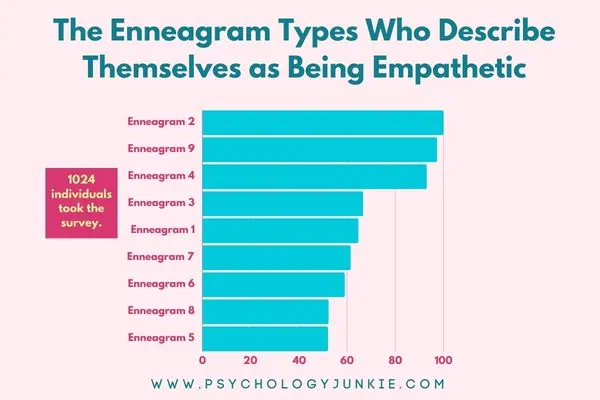
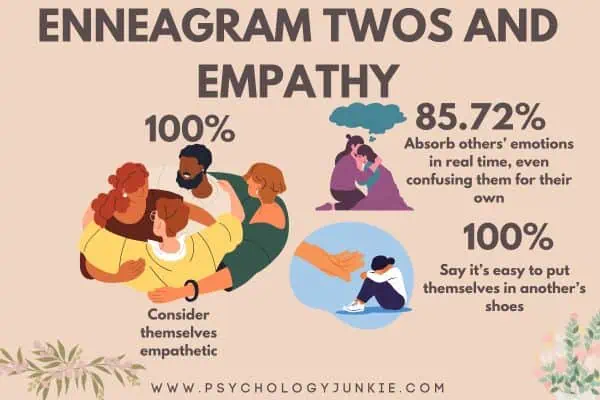
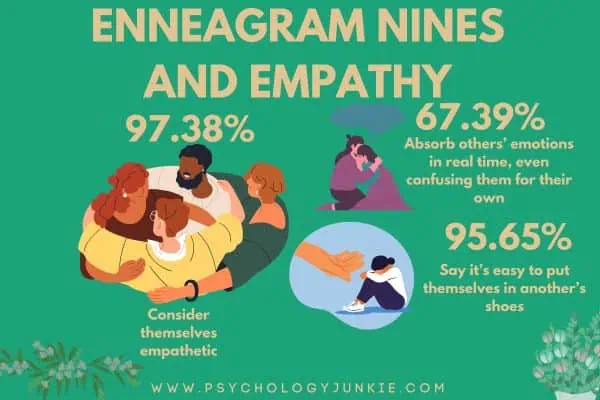
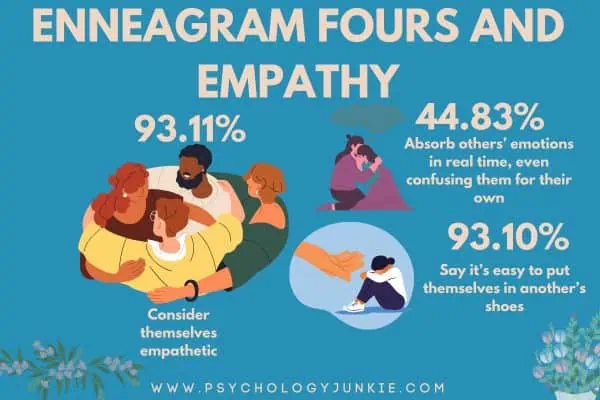
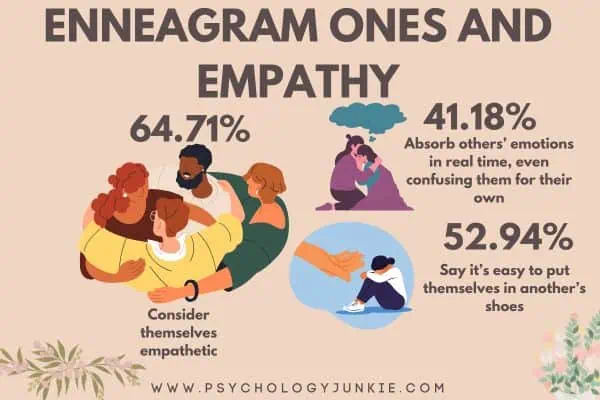
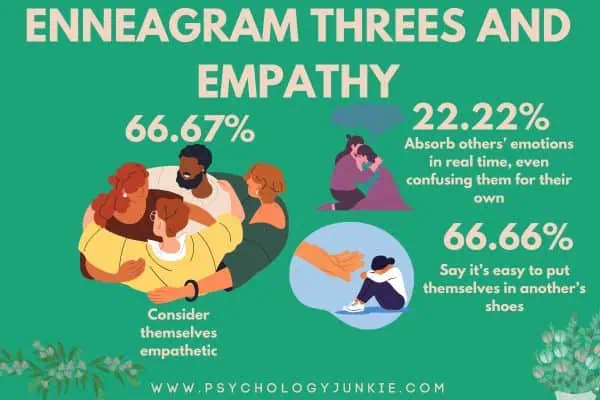
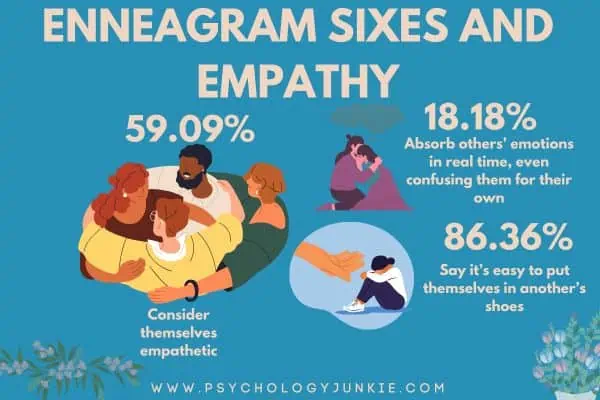
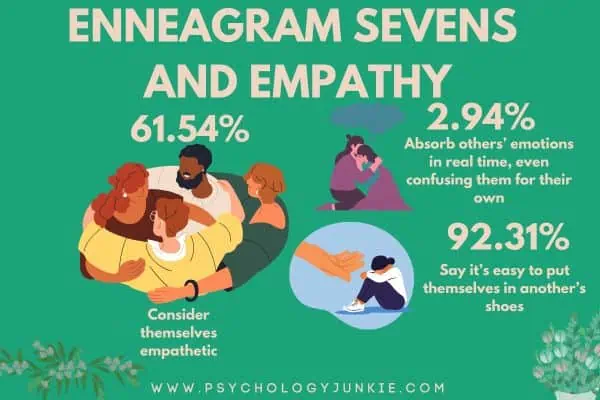
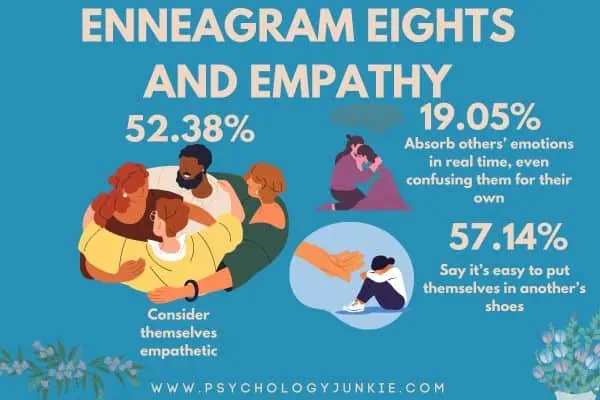
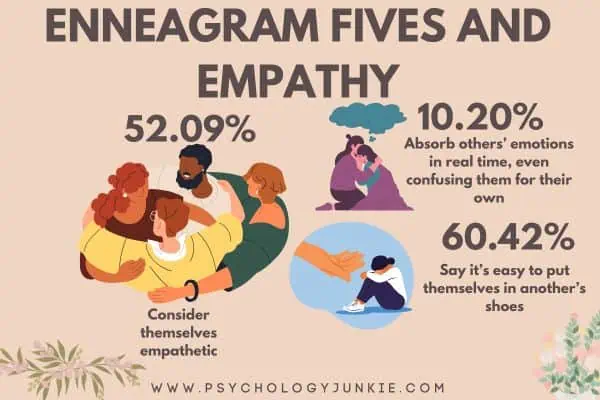

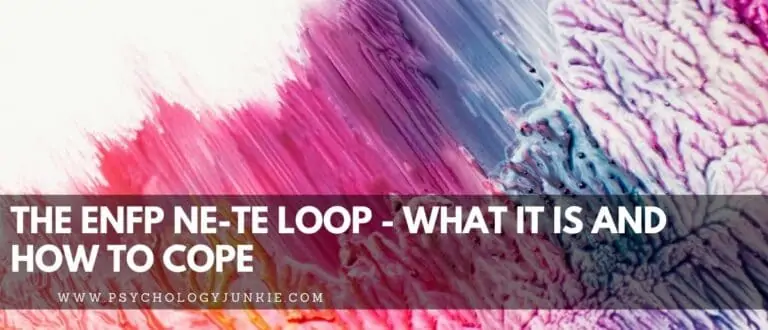
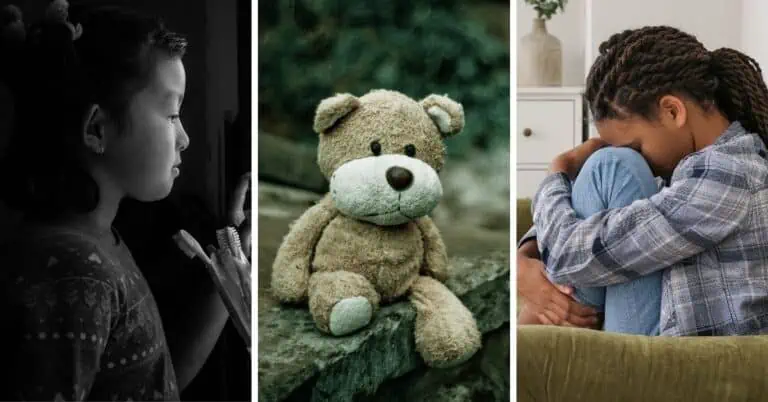
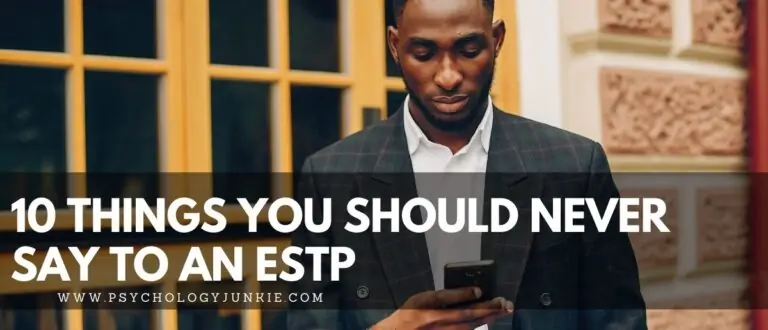


As a five this is to true! My entire family are strong feelers, and don’t ever understand it when they’re crying their eyes out and I go ahead and tell them how to fix it instead of crying with them.
Wow, was hoping 6s would score higher… doesn’t seem like we’re really good at anything except anxiety, planning (which computers can do) and blindly following 🙁